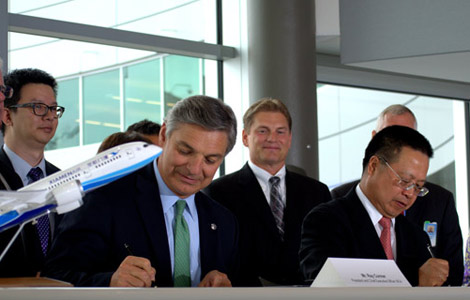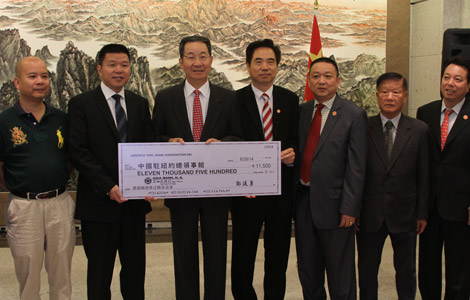Tech firms pushing portable Wi-Fi
Updated: 2014-08-26 06:52
By Su Zhou in Beijing and Lin Jing in Hong Kong(China Daily)
|
||||||||
Technology companies are looking hard at the promising portable Wi-Fi services market to meet the high-speed Internet demands of increasing numbers of Chinese heading outside the mainland and overseas.
The companies hope to expand their Wi-Fi business overseas to allow frequent travelers to enjoy local mobile data services cheaply.
Accessing mobile Internet services at a reasonable cost is a big headache for visitors.
Wang Yu, a researcher at a consulting firm in Beijing, said that five days after she returned from Hong Kong, she found that the 1,000 yuan ($163) she deposited in her cellphone account had been used.
"I knew it was expensive, but I had no choice," Wang, 30, said. "I didn't want to have a local phone number just for a five-day trip."
A survey by Sina.com, a leading Web portal in China, found that 77.7 percent of outbound tourists say they must have access to the Internet, while nearly 64 percent want free Wi-Fi at hotels, airports and restaurants because they feel that fees charged by their communication companies are too high.
US-listed Ctrip.com International, the largest online travel agency in China by market share, said 90 percent of tourists will choose a travel service based on whether they can gain access to free Wi-Fi.
Chinese companies are beginning to offer portable Wi-Fi services to help outbound tourists with their daily fees - keeping these to less than 40 yuan. In contrast, the average cost of an overseas mobile Internet service is about 70 yuan per 100 megabytes per day.
Liu Jing, founder and CEO of Skyroam, which focuses on overseas Wi-Fi services, said its clients can enjoy unlimited access to local communication networks for 29 yuan a day and at least five mobile devices can be connected to one Wi-Fi service.
Liu said: "I noticed this trend emerging five years ago. Many travelers told me their biggest headache was the cost of roaming services. If they wanted to use a local service, they needed to get a local phone number or even a new phone. For tourists, this is a waste of money."
Liu's team worked on this for five years, found a service model to lower the cost and provided it to travel agencies and outbound tourists. Skyroam covers 45 countries and the number is expected to rise to more than 100 in the coming year.
Wang said this service is highly attractive, especially for frequent business travelers.
"Some of them have to travel to different countries in the same month. It is a big headache to have too many local phone numbers, but a service like this has no border limits."
Skyroam and other companies provide a service for Chinese tourists, but are thinking of expanding their business to overseas clients.
Elvis Yan, head of marketing at Truphone in Hong Kong, said the market on the mainland is catching up.
"The presence of three State-owned mobile communication giants on the mainland makes it difficult for companies to partner and negotiate good wholesale deals," Yan said.
"The overseas market consists of a diverse mix of operators with different standards. This will require companies to spend a considerable amount of their resources to liaise with all operators in different markets.
"Being strictly regulated, telecommunications is a politically sensitive industry and it is never easy to enter any market.
"It is also hard to find a single service that fits all markets, so I think the new roaming service will require a considerable amount of service localization to make it successful in other countries. "
Contact the writers at suzhou@chinadaily.com.cn and linjingcd@chinadaily.com.cn
(China Daily 08/26/2014 page1)

 Peace Mission - 2014 military drill ends in China's Inner Mongolia
Peace Mission - 2014 military drill ends in China's Inner Mongolia
 First steps on a journey of discovery
First steps on a journey of discovery
 Garbage dump turns water into poison
Garbage dump turns water into poison
 Vintage cars exhibition opens in Jinan
Vintage cars exhibition opens in Jinan
 Discussion on Chinese FDI
Discussion on Chinese FDI
 Boeing, Xiamen Airlines celebrate 787 Dreamliner delivery
Boeing, Xiamen Airlines celebrate 787 Dreamliner delivery
 US photographer captures amazing starry night
US photographer captures amazing starry night
 More earthquake relief rolls in
More earthquake relief rolls in
Most Viewed
Editor's Picks

|

|

|

|

|

|
Today's Top News
Chinese American to run NYC public schools' fund
US launches fresh air strikes on IS rebels
NPC decision a landmark in HK democratic development
Chui Sai On elected Macao chief executive-designate
Exhibition on China-US WWII collaboration unveiled
Google building delivery drones
US, China plan followup to Sunnylands summit
US urged to stop recon
US Weekly

|

|







